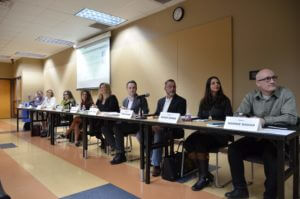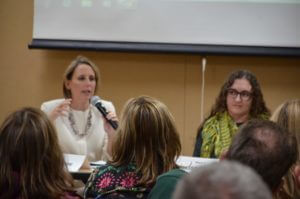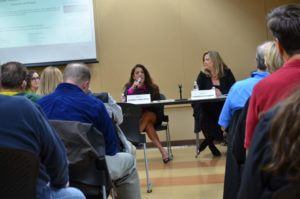
Ten candidates are running for four positions on the Leander ISD Board of Trustees. Nine of the candidates took part in the second forum on Oct. 15 hosted by the Leander ISD PTA Council. Each candidate answered a variety of questions at the event held at Austin Community College’s Cypress Creek campus. LYNETTE HAALAND
By KAYLA BOUCHARD, Hill Country News
Nine of the ten Leander ISD school board candidates came together at the second forum hosted by the Leander ISD PTA Council on Oct. 15 at Austin Community College’s Cypress Creek campus. They answered questions that were submitted ranging from school safety and mental health support to zoning, debt and special education. Early voting started on Monday.
Board of Trustees incumbent Trish Bode and challengers Bryan Patton and Melissa Glaze are running for Place 1. Gloria Gonzales-Dholakia, Gary Hampton — who did not attend the forum — and Sharyn LaCombe are running for Place 2. Incumbent Aaron Johnson and challenger Mike Fischer are running for Place 6, and Elexis Grimes and Donnie Mahan are running for Place 7.
Starting off the forum, Bode, Patton and Glaze were asked what they see as the district’s role in providing mental health, behavioral and wellbeing instruction while still maintaining excellence in academics.
Patton said Texas is investing in mental health programs at the state level but improving counselors on a local level is just as important.
“I don’t think they’re mutually exclusive so I don’t think you have to sacrifice academics or mental health programs,” said Patton. “This is a big push. We’re seeing about 54 billion dollars come through the state budget this year for mental health and safety programs across the entire state so there’s money available for these things… Other alternatives could begin by beefing up counselors, working on back end systems so they’re not spending so much time doing scheduling and freeing them up to do their jobs and giving them and teachers professional development to do their jobs.”
Bode said she advocates for training counselors to be experienced as they help students in their struggles.
“Your school district is your safety net or your triage so getting our counselors who are well-equipped and well-informed who can help when our students come into our offices with an issue are critical,” Bode said. “We have, as a board, seen a need and increased counselors to address this… by giving our students the tools in elementary of how do you listen, how do you problem-solve is important.”
Glaze said that supporting teachers will strengthen the entire school community.
“I view mental and emotional wellbeing not as separate from academic achievement but is really crucial to it, ” said Glaze. “If we are enabling our teachers with training, reduced administrative burdens, volunteers in the classroom…there are so many things that we can do to help our teachers, support our teachers in their most crucial role which is teaching. It really does support the entire community, the entire classroom, it’s academic achievement and, from a place of human empathy, it supports these children who are our charges.
Gonzales-Dholakia and LaCombe were then asked about their ideas for practices of zoning as the district prepares to rezone a large number of the middle schools during the upcoming winter months, especially in the northern part of the district.
Gonzales-Dholakia said that maintaining open communication about zoning projects is a top priority.
“We want communication,” Gonzales-Dholakia said. “We want communication as taxpayers, as parents, we want communication and transparency in the process… we need to create systems where we’re not rezoning the same families over and over. It’s very important for a sense of community, a sense of positive mental health for our students that are not changing their community and changing the school that they’re going to every few years so looking at a process for creating that… Ultimately I think the solution is communication, lots of it, over and over.”
LaCombe agreed with Gonzales-Dholakia on an emphasis of communication and transparency with zoning projects.
“This is an issue that will continue to be of concern in areas north of the district because we’re growing at such fast pace,” LaCombe said. “We have elementary schools that are within a mile of each other and middle schools that are within a mile of each other. I think establishing as much of a base that doesn’t get moved and doesn’t get rezoned and having that information available for the parents will help with being transparent.”
Johnson and Fischer were asked what parts from the special education process from diagnosis to accomodation work well and what needs to be improved.
Johnson said that special education programs from any district are extremely complex entities.
“[Special education programs] are managed by federal law and describes how special education should be delivered,” Johnson said. “Leander ISD has a very high-functioning special ed program. That said, just like any other program in LISD, it is appropriate for us to evaluate and investigate that program. It’s been sometime since the district has investigated the special ed program internally and reported to the board… the first thing I would recommend is that it is about time for us to have that kind of a review. I think it’s important for us to do that on a regular, periodic basis to keep the community informed, allow the community to provide input and allow the board to review the performance of the district in this regard.”
Fischer said that special education programs will flourish with teachers that are cared for and trained by the district.
“What works well in a special education classroom is a highly-paid, highly-trained, caring professional,” said Fischer. “Financial equity ios probably the highest indicator we have for what we’re going to get out of our special education programs. There needs to be equitable funding and equitable training to pay attention to what those kids are needing. It’s difficult, I applaud Mr. Johnson and the board and the district as a whole for not having caps or ceilings. There is more that we can do. I would like to say that with good, strong supervision, a well-balanced budget for the special education program, we can see growth and achieve thing we didn’t think were possible before.”
The forum ended with Grimes and Mahan being asked how they would balance the costs of any additional programs you propose against a goal of reducing the district’s debt of $3.6 billion.
Grimes said that reducing the district’s debt can be done in several ways.
“We have opportunities with construction costs where we’re paying almost 40 percent more for new construction than we should be paying,” said Grimes. “I think we should also look at our budget and start from a zero budget and look at what the spendings are and where the spending is wasted and weed out those issues… we might need an audit and if we need an audit, then we go through an audit and see that, okay, maybe we’re doing the best things we can be doing and maybe we have areas to improve where we can reduce where we’re spending.”
Mahan finished by stating the need to use money wisely for the benefit of the whole district.
“I think we need to spend money like it’s our money, not like it’s everyone else’s money,” said Mahan. “We need to make common sense budget decisions. We need to do things that are right by the community for our district. I looked at the bond package for last year and it had a ten million dollar design for the next high school. Glenn High School’s three years old, what’s wrong with that design? Little things like that add up to a lot… I think that there’s some common sense things that we can do as a district that we’re not doing today. I think those are the things we need to look forward to, that we need to be thinking five or ten years down the road. Not one or two years down the road.”
The general election is Nov. 6. Early voting began Oct. 22.The first candidate forum was Sept. 25, here is the link, https://vimeo.com/292736627 Here is a link to the second forum on Oct. 15: https://vimeo.com/296203417



